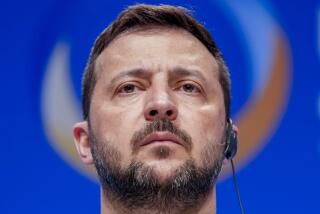Things <i> Seem</i> to Be Looking Up
- Share via
After 40 years of armed suspense on Europe’s East-West border, the Soviet Union is making its move, led not by tanks but by a tireless and affable gentleman who seems to many in the West as dependable as any of their own statesmen.
The operative word has to be seems , because Soviet President Mikhail S. Gorbachev still has a lot of promises to keep. He must whittle his Central European army and air force down to size, stop agitating in the Third World and prevent his own country from going bankrupt.
Still, he has kept enough promises, such as pulling Soviet troops out of Afghanistan and delighting the artists, writers and intellectuals of his country with a forum for open criticism of communism’s shortcomings, to be taken seriously. And West Germany did just that last week with welcoming crowds and toasts to a secure mutual future that marked Gorbachev’s visit.
In the same week, Adm. William J. Crowe, chairman of the U.S. Joint Chiefs of Staff, signed an agreement with his Soviet counterpart designed to prevent accidental encounters of military forces from turning into real confrontations. Gorbachev praised President Bush’s proposals for reductions in air and ground forces along the East-West border as a positive step forward. Former President Reagan, visiting England, put in another good word for Gorbachev, calling him the only hope for drawing his country out of its sullen isolation.
Despite such weeks, Washington still has to wonder where the affable gentleman is going and why. The best answer for now probably is that he has no clear idea and is just taking one step at a time. He knows that the future of his country demands cuts in his defense budget and more consumer goods for his people, and that will keep him moving toward arms controls for a long time. From less defense spending, the trail should lead to reductions in tanks, paratroopers and other offensive forces to cut the risk of, and Western European concern over, invasion to a minimum.
To keep his own hard-liners at bay, Gorbachev needs to draw West Germany closer to Moscow as he relaxes the Soviet hold on Poland and Hungary and allows them to turn more to the West, a sort of hostage exchange. It is also crucial to his hopes for reform that Western credit is available for consumer goods that his people yearn for as well as technical help to make Soviet factories produce goods of decent quality.
West Germany’s Helmut Kohl is now an enthusiastic partner in change. Last month, Kohl risked bending the North Atlantic Treaty Organization out of shape by calling for negotiations on short-range nuclear missiles with Moscow. That has blown over for now, but the joint declaration of peaceful intentions that he signed with Gorbachev makes it plain that West Germany regarded the festive four-day visit as a window on a future in which it will pursue policies that Washington may not always see as a perfect fit with its own.
A telling moment came when Gorbachev, whose most insistent message was that Moscow wants to be part of Europe and of its bright economic future, said of the Berlin Wall that “nothing is eternal.” That is not a promise to tear it down, but then no other Soviet leader has ever been caught suggesting that the wall is not forever.
The remark also is a reminder that change may not maintain the momentum of recent months. Centuries of tribal rivalries and decades of more recent ideological divisions of which the Wall is one symbol do not disappear just because Gorbachev wills it to be. It could, indeed, apply to the affable gentleman himself if he loses his way moving toward his own vision of the future. All the more reason, it seems to us, to step up the pace of arms control negotiations while the opportunity exists and Moscow’s leadership is so willing.
More to Read
Sign up for Essential California
The most important California stories and recommendations in your inbox every morning.
You may occasionally receive promotional content from the Los Angeles Times.













